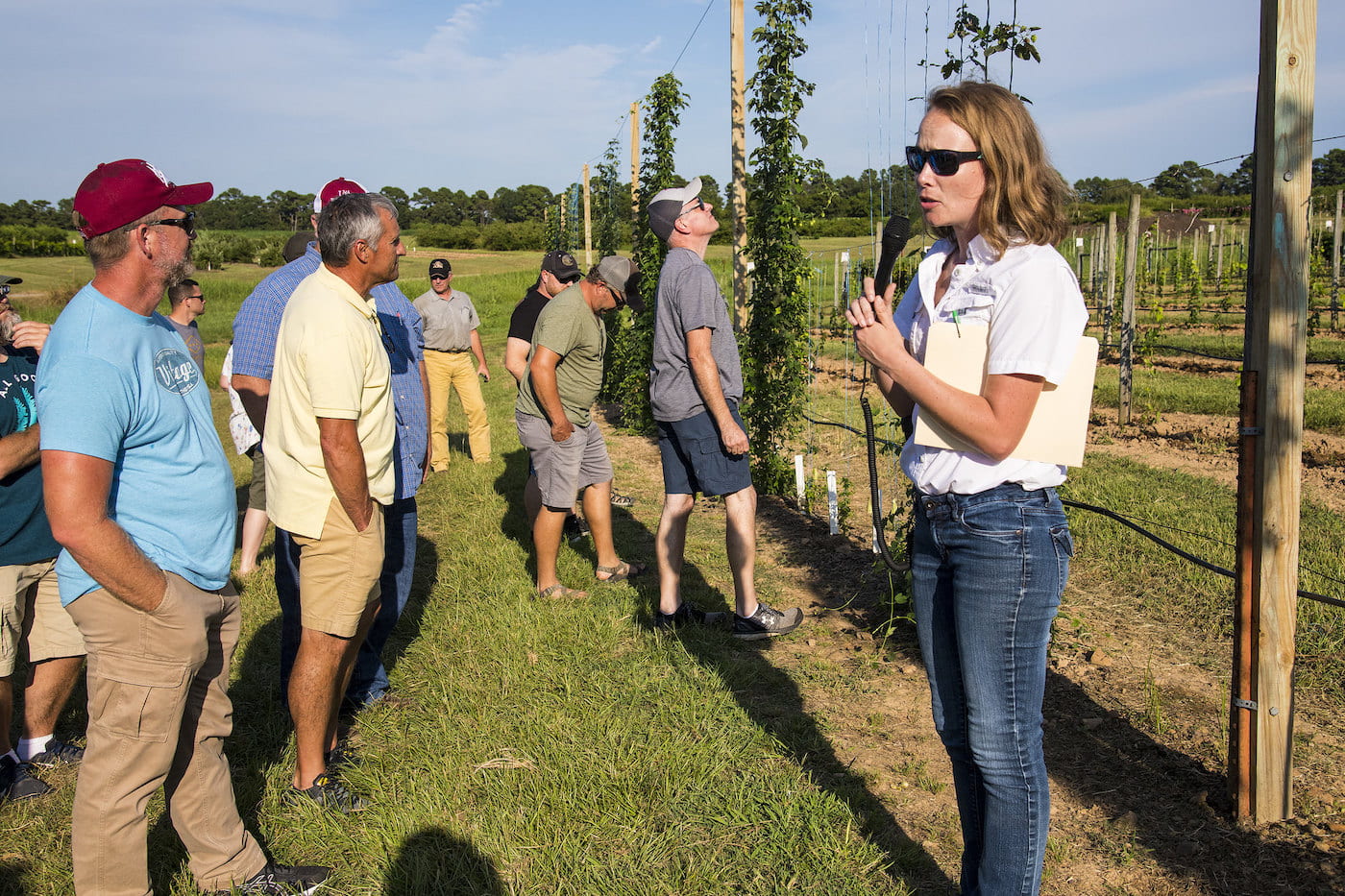Fruit Research Station Study Shows Promise for Hops in Arkansas

Extension horticulture specialist Amanda McWhirt describes cultural practices used in the Fruit Research Station’s hops yard during the Division of Agriculture Hops Workshop. Some 60 participants attended the workshop. (UA System Division of Agriculture photo by Fred Miller)

Amanda McWhirt
Assistant Professor and Extension Horticulture Production Specialist – Horticulture
Contact Amanda McWhirt
The Problem
Arkansas’ craft beer brewing industry has shown exponential growth in recent years. The number of licensed breweries in Arkansas has increased from six in 2011 to 43 in 2020, according to The Brewers Association, a national organization based in Boulder, Colorado. Most of the nation’s hops for the craft beer industry are grown in northern states where the day length is longer, which increases alpha acid levels.
The Experiment Station conducted an experiment to find out which cultivars of hops grow best in Arkansas. Specialty crop growers or breweries could use Arkansas-grown hops to impart bittering flavors and aromas to craft beer products. Breweries could then sell a unique product and experience, grown and brewed in-state, to consumers.
The Work
A three-year research and evaluation project was completed in 2021 at the Arkansas Agricultural Experiment Station’s Fruit Research Station in Clarksville, and preliminary data shows there are two varieties of hops that can be grown successfully in Arkansas.
A team of experts from the University of Arkansas System Division of Agriculture worked together to evaluate hops in Arkansas: Amanda McWhirt, assistant professor and fruit and vegetable extension specialist; Renee Threlfall, Arkansas Agricultural Experiment Station research scientist; and Aaron Cato, assistant professor and fruit and vegetable IPM specialist.
Five cultivars of hops were grown at the Fruit Research Station in Clarksville beginning in 2019. The cultivars included Cascade, Centennial, Crystal, Cashmere, Nugget and Zeus.
The hops were planted in the fall of 2018. In the spring of 2019, the first year of the study, the bines were trained to grow up a trellis system. The plants were checked to make sure no male plants were present to ensure no seeds were produced in the hop cones. The hop plants, which are crown-forming perennials, were left to grow back the following spring after being harvested in the fall. Hop plants can live for 10 to 25 years.
Site selection was key, McWhirt said, using soil that drains well and not prone to wind damage because of the 12-foot-high trellis. A drip irrigation system was also used. Herbicides were used for weed control instead of black plastic or landscape fabric following an evaluation that found the hops struggled because of warmer soil temperatures created by the cover.
The Results
Preliminary data from test plots at the Fruit Research Station in Clarksville showed that Cascade and Zeus hops had the best yields, plant health and vigor. Crystal and Cashmere showed moderate potential in Arkansas. In 2020, Cascade hops grown at the Fruit Research Station yielded about 2.6 pounds of wet hops per plant compared to 2.4 pounds for Zeus, 1.4 pounds for Crystal and 1 pound for Cashmere.
Threlfall said that more work is needed to determine cultivation best practices for Arkansas. For example, the hops in the study only have three bines trained per plant and researchers want to increase them to six bines per plant to potentially increase yield.
Cascade and Zeus hops in the second year had yields and alpha/beta acid levels slightly lower but comparable to commercial cultivars. Levels of alpha and beta acids characterize the bitterness and aroma of hops varieties. Third-year yields, usually higher with plant maturity, were lower than expected. The researchers are still investigating a possible cause for this but point out that July and August of 2021 were very dry, and hops need a lot of water applied daily during dry periods to maintain the plants during cone set.
In 2021, the Cascade hops grown at the Fruit Research Station yielded on average just under one pound per plant. It was the third most productive variety that year. The largest yield in 2021 came from the Crystal hop bines with an average of 1.65 pounds per plant. Second place in yield went to Zeus with an average of just over a pound, followed by yields of 12.5 ounces in Cashmere hops, about 0.67 ounces for Centennial and about 10 ounces for Nugget.
The Value
Although most of the nation’s hops for the craft beer industry are grown in northern states where the day length is longer, which increases alpha acid levels, the study shows that some hops can be a viable specialty crop in Arkansas to appeal to the microbrewery industry in the state.
Funding
Primary – Specialty Crop Block Grant from the Arkansas Department of Agriculture
About the Researchers

Amanda McWhirt
Assistant Professor and Extension Horticulture Production Specialist, Horticulture
B.S. in Horticulture from Tarleton State University
M.S. in Soil Science from Louisiana State University
Ph.D. in Crop Science at North Carolina State University
Research interests include production practices that increase cropping system efficiency and soil management practices for small fruit production.

Renee Threlfall
Research Scientist, Enology and Viticulture
Ph.D.- University of Arkansas, Fayetteville (Food Science)
M.S.- University of Arkansas, Fayetteville (Food Science)
B.S.- University of Arkansas, Fayetteville (Microbiology)
Research focuses on specialty crops with expertise in enology and viticulture (winemaking and grape growing), as well as the processing of small fruits (grapes, blackberries, strawberries, peaches, etc.).

